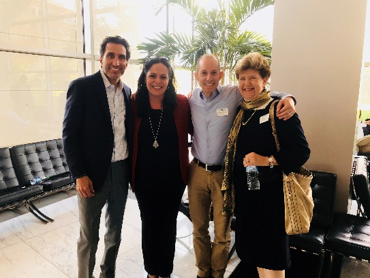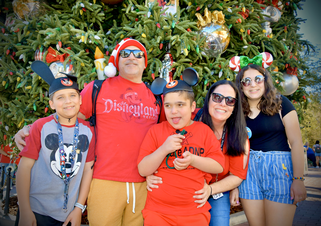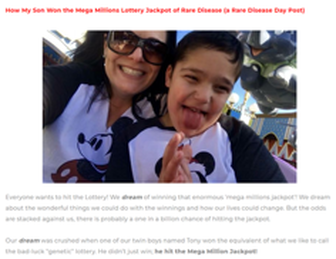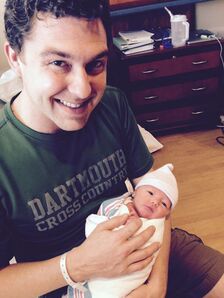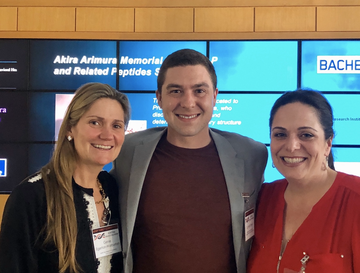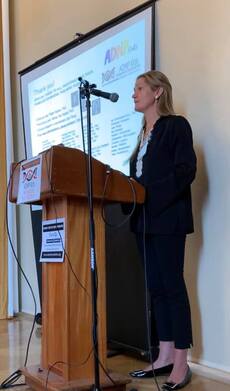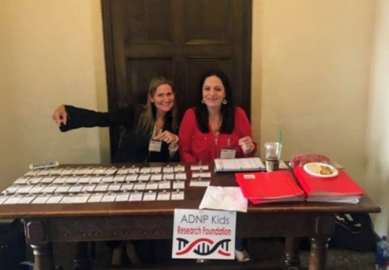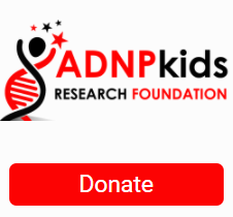2-25-2020 correction 12/31/2022
FOR IMMEDIATE RELEASE:
FOR IMMEDIATE RELEASE:
Parents Find Glimpse of Hope For Treatment of Their Children's Rare Genetic Disorder.
STORY PITCH:
It's a compelling story; a parent learns their child has a rare life threatening disease with no treatment and no cure, though not a scientist in rare disease, embarks on a quest to find treatment. It is a story you hear in the rare disease space time and time again. But most of those stories almost always fail because of the difficulty in getting large pharmaceutical companies to grab the very expensive baton of developing a new drug for a small rare disease affecting children.
Still some parents, have chosen to take matters into their own hands to help their children by getting involved in science, drug discovery and advocacy.
Sandra Sermone, Washington and Matt Davis, Alabama, are parents of children with ADNP syndrome who started thinking outside the box when it comes to accelerating drug development for children with ADNP syndrome and they have chosen to embark on the possibly quicker and somewhat less expensive route of repurposed drugs. Repurposed drugs come from investigating existing drugs for new therapeutic purposes, ones that are already FDA approved for another condition, to provide the quickest possible transition from bench to bedside.
ADNP Syndrome is an ultra rare neurological genetic condition which causes intellectual and neurodevelopmental disabilities, speech delays, autism, seizures, low muscle tone, cardiac and brain abnormalities, and is currently diagnosed in less than 250 children in the world.
Currently, there's not one single FDA approved treatment available for children with ADNP syndrome, and there is NO CURE! But recently, these parents led a team at Mount Sinai to embark on the first-ever clinical trial for ADNP syndrome using a 'repurposed drug'; and this all happened in a very unique and very surprising way; when they pulled their resources together and started working with more parents of children with rare disease.
Through Artificial Intelligence (AI), which is the use of machine learning and big computing to hunt for already existing pharmaceuticals that could be therapeutic for a specific rare disease, they found, researched and presented a 'repurposed drug' that showed a lot of promise to Mount Sinai, who then took the lead and just last week, the FDA gave approval to start a clinical trial on that repurposed drug. They hope to begin the trial in the next few months.
Now they are working to raise the money needed for this drug trial that they believe could help improve the lives and challenges of children who suffer with this condition. Sermone says, "from start to finish, a small phase 2 and a large multi center phase 3 study should cost we hope just under one million dollars which is a small fraction of what a normal drug trial would cost so we are very lucky to have found a 'repurposed drug'; "It's not a cure, but for now, if we can improve the tiniest thing, and give these kids even a slightly brighter tomorrow than they have today, it will be a dream".
It's a compelling story; a parent learns their child has a rare life threatening disease with no treatment and no cure, though not a scientist in rare disease, embarks on a quest to find treatment. It is a story you hear in the rare disease space time and time again. But most of those stories almost always fail because of the difficulty in getting large pharmaceutical companies to grab the very expensive baton of developing a new drug for a small rare disease affecting children.
Still some parents, have chosen to take matters into their own hands to help their children by getting involved in science, drug discovery and advocacy.
Sandra Sermone, Washington and Matt Davis, Alabama, are parents of children with ADNP syndrome who started thinking outside the box when it comes to accelerating drug development for children with ADNP syndrome and they have chosen to embark on the possibly quicker and somewhat less expensive route of repurposed drugs. Repurposed drugs come from investigating existing drugs for new therapeutic purposes, ones that are already FDA approved for another condition, to provide the quickest possible transition from bench to bedside.
ADNP Syndrome is an ultra rare neurological genetic condition which causes intellectual and neurodevelopmental disabilities, speech delays, autism, seizures, low muscle tone, cardiac and brain abnormalities, and is currently diagnosed in less than 250 children in the world.
Currently, there's not one single FDA approved treatment available for children with ADNP syndrome, and there is NO CURE! But recently, these parents led a team at Mount Sinai to embark on the first-ever clinical trial for ADNP syndrome using a 'repurposed drug'; and this all happened in a very unique and very surprising way; when they pulled their resources together and started working with more parents of children with rare disease.
Through Artificial Intelligence (AI), which is the use of machine learning and big computing to hunt for already existing pharmaceuticals that could be therapeutic for a specific rare disease, they found, researched and presented a 'repurposed drug' that showed a lot of promise to Mount Sinai, who then took the lead and just last week, the FDA gave approval to start a clinical trial on that repurposed drug. They hope to begin the trial in the next few months.
Now they are working to raise the money needed for this drug trial that they believe could help improve the lives and challenges of children who suffer with this condition. Sermone says, "from start to finish, a small phase 2 and a large multi center phase 3 study should cost we hope just under one million dollars which is a small fraction of what a normal drug trial would cost so we are very lucky to have found a 'repurposed drug'; "It's not a cure, but for now, if we can improve the tiniest thing, and give these kids even a slightly brighter tomorrow than they have today, it will be a dream".
reThat drug investigation began last year, when Sermone, the founder of ADNPkids and the ADNP Kids Research Foundation, teamed up with Davis, a Neurosurgery at University of Alabama Birmingham. Both being parents of children with ADNP, they began working together looking for ways to find treatments for ADNP syndrome.
They started looking into repurposed drug development after a 2018 peptide called CP201 trial seemed to come to a complete stop. During that time, Davis was approached by a fellow UAB researcher, Matt Might, Ph.D., a computer scientist, who also has a child with a rare disease called NGLY1 and knows Sermone through their advocacy in the rare disease space. Might had talked with Sermone numerous times about looking for treatments for ADNP, and was working with artificial intelligence (AI) technology, with hopes to connect patients with possible treatment ideas. Might found some information on a few different compounds, one drug named ketamine stood out and Sermone and Davis were off to the races in search of clinical data to build a puzzle that would hopefully end in a possible treatment for their children!
Davis was able to pull relevant medical publications and compiled data and Sermone started attending biotech and drug development conferences. They researched hundreds of pages of medical literature, contacted and spoke to other scientists and collected relevant data to build a case for low-dose ketamine as quickly as they could. They strongly believe low-dose ketamine may help their children.
Ketamine is already FDA approved safe in children at sedation levels, but this study aims to use low dose levels for treatment. Ketamine has made headlines recently when it obtained FDA approval in intranasal esketamine (SpravatoÒ) for treatment-resistant depression. However, and important for ADNP syndrome, studies in animal models suggest that low-dose ketamine may increase expression of ADNP in nerve cells. For this reason, treatment with low-dose ketamine may have beneficial effects in individuals with ADNP syndrome by compensating for ADNP insufficiency and could increase the protein and possibly be therapeutic.
They took their findings to Dr. Buxbaum at Mount Sinai. His team, led by Dr. Alex Kolevzon, felt this could be a viable treatment and Kolevzon took the lead by submitting the study to the FDA in December. Last week they received a response from the FDA saying that the trial was safe to proceed to study of ketamine as treatment of ADNP.
"This model of patient involved research is crucial to driving breakthroughs in science for rare disease. We are desperate and it's up to us to try to do everything that we can and push like hell for research and drug discovery because no one else is going to care more about our children than we are", says Sermone.
They started looking into repurposed drug development after a 2018 peptide called CP201 trial seemed to come to a complete stop. During that time, Davis was approached by a fellow UAB researcher, Matt Might, Ph.D., a computer scientist, who also has a child with a rare disease called NGLY1 and knows Sermone through their advocacy in the rare disease space. Might had talked with Sermone numerous times about looking for treatments for ADNP, and was working with artificial intelligence (AI) technology, with hopes to connect patients with possible treatment ideas. Might found some information on a few different compounds, one drug named ketamine stood out and Sermone and Davis were off to the races in search of clinical data to build a puzzle that would hopefully end in a possible treatment for their children!
Davis was able to pull relevant medical publications and compiled data and Sermone started attending biotech and drug development conferences. They researched hundreds of pages of medical literature, contacted and spoke to other scientists and collected relevant data to build a case for low-dose ketamine as quickly as they could. They strongly believe low-dose ketamine may help their children.
Ketamine is already FDA approved safe in children at sedation levels, but this study aims to use low dose levels for treatment. Ketamine has made headlines recently when it obtained FDA approval in intranasal esketamine (SpravatoÒ) for treatment-resistant depression. However, and important for ADNP syndrome, studies in animal models suggest that low-dose ketamine may increase expression of ADNP in nerve cells. For this reason, treatment with low-dose ketamine may have beneficial effects in individuals with ADNP syndrome by compensating for ADNP insufficiency and could increase the protein and possibly be therapeutic.
They took their findings to Dr. Buxbaum at Mount Sinai. His team, led by Dr. Alex Kolevzon, felt this could be a viable treatment and Kolevzon took the lead by submitting the study to the FDA in December. Last week they received a response from the FDA saying that the trial was safe to proceed to study of ketamine as treatment of ADNP.
"This model of patient involved research is crucial to driving breakthroughs in science for rare disease. We are desperate and it's up to us to try to do everything that we can and push like hell for research and drug discovery because no one else is going to care more about our children than we are", says Sermone.
Additionally, they believe it is crucial to raise awareness of this disorder because last month, in the largest genetic sequencing study of autism spectrum disorder (ASD) to date (CELL Journal), researchers identified the "ADNP gene" as one of the top genes related to autism and neurodevelopmental dysfunction.
The landmark study was led by Joseph Buxbaum, PhD, Director of the Seaver Autism Center for Research and Treatment at Mount Sinai, through an NIH-funded international Autism Sequencing Consortium. He calls it a “profound neurobiological advance”.
Interestingly, most of the genes at the top of the list in that report cause 'rare diseases' similar to ADNP Syndrome, yet not many people know that a rare disease could be so closely associated with autism.
But is this really as rare as everyone thinks?
Dr. Buxbaum, the lead of that report doesn’t think so. He estimates that 1 in 20,000 could have an ADNP mutation causing autistic traits and/or developmental delays. Yes, we repeat, 1 in 20,000.
"We believe there could be thousands and thousands of children who have this genetic variant, and their families have no idea", says Sermone. So why is important to know for this story? Sermone explains, "These pharmaceutical companies who could help our children are far more interested when there are more patients. We know they are out there, the recent research proves it, we just need to find them because it is very important for research and drug development, and if those families don't get testing, they won't know we might have a drug that could help their child."
“Our children with this syndrome need treatments now! They suffer every day. This isn’t the gifted type of autism that you see on TV, my son is never going to be a doctor. Instead, he is like an infant trapped in a 12 year old body, he has medical issues head to toe, wicked intellectual and developmental delays, he is non verbal, his brain is shrinking, and he keeps loosing skills. And beyond all of that, he has severe autism which is just about one of the hardest things to deal with. It’s beyond heartbreaking and not at all the life we hoped for our son, it's not at all what any parent would ever want for their child. But this is bigger than him now, because now we have 250 kids from all around the world, many of whom are babies, and there are possibly thousands more that also desperately need help."
MEET THE PARENTS:
Sandra Sermone is the mother of Tony, a 12 year old boy from Brush Prairie, Washington who lives with his twin brother Rocco, his parents Rich and Sandra and his sister Sophia. However, Tony is very different from the rest of his family, including his twin brother, because Tony was born with a non hereditary genetic mutation on his ADNP gene.
Sandra Sermone is the mother of Tony, a 12 year old boy from Brush Prairie, Washington who lives with his twin brother Rocco, his parents Rich and Sandra and his sister Sophia. However, Tony is very different from the rest of his family, including his twin brother, because Tony was born with a non hereditary genetic mutation on his ADNP gene.
Tony had a very rough start. He lived in and out of the hospital for years with a never ending list of surgeries, procedures, testing, medical complications and emergencies, including two open heart surgeries. It took close to 6 years to diagnose 2014. Tony was one of the very first children in the world diagnosed and at the time, the syndrome was so new that it didn’t even have a name and very little was known about it. There were NO doctors who understood it, NO information on what to do, NO support group or website, and worst of all, NO treatments and NO cure. Tony is the only human in the world with his specific mutation location, imagine that, the only one in the world. Sandra wrote about the rarity of the disorder in a very easy to understand blog: How My Son Won The Mega Million Lottery Jackpot of Rare Disease.
After Tony was diagnosed, Sandra came home armed with the one and only publication that existed on the syndrome. She dove in head first into research and began searching and working with scientists from around the world and started building her research team. She has pioneered nearly everything informational that exists for ADNP syndrome; she created the first parent support group to find and connect families, built a strong international ADNP community, created ADNPkids.com, which is the worlds first ADNP syndrome information website, and founded the ADNP Kids Research Foundation. She is not a doctor, but she built her own parent generated patient registry, joined forces to partner in larger studies and conducted her own research. Sandra made the discovery of the very first diagnostic biomarker of ADNP syndrome and because of her research, she has been a co-author on 5 medical publications in peer reviewed journals such as Nature Translational Science and the Journal of Molecular Neuroscience.
Matt Davis is completing his training in neurosurgery at the University of Alabama Birmingham. He specilizes in the management of neurological disorders, and is completing his training in neurological surgery, with fellowship training in functional neurosurgery and epilepsy surgery. He has years of experience with clinical trials and now has a vested interest in drug development for ADNP syndrome because his son was one of the youngest children diagnosed with ADNP syndrome. Benjamin is the first child of Matt and his wife Anna. He was born a seemingly healthy and adorable baby boy to this young family just starting off. But was he showed developmental delays and medical issues were becoming apparent. Matt and Anna felt like something was not right so they decided to have genetic testing early on. Their son was just 1 year old when he was diagnosed with ADNP syndrome in 2017. Following Benjamin's diagnoses, both Matt and his wife found and connected with Sandra and joined the parent support group to connect with other families.
|
Matt decided right from the start to jump into intensely researching a peptide that was being proposed for ADNP syndrome in Israel called NAP/CP201 that was slowly moving forward for several years, and in 2018, after a pre-IND meeting, seemed to come to a complete stop. Matt teamed up with Sandra and started looking deeper into the peptide that stalled, and they both became frustrated because of the time that was going by with no movement forward. |
Desperate to do something, they began do some work on their own and had started having conversations about 'repurposed drug development'. This is when they came across ketamine, as well as a few other possible treatments that they are still researching. They investigated it, summarized it, hired an attorney, filed for IP and then presented their information to Dr. Joseph Buxbaum at Mount Sinai. This is certainly not the norm. Parents do not present repurposed drug ideas to directors of medical centers that go to drug trial. But their persistence paid off and they now believe that they have a viable treatment option that could help their children and others. They have the FDA's approval to begin, now they must raise a lot of money to fund the study.
This is where one more parent joins the story and makes this duo even stronger. A mother named Genie Egerton-Warburton from New York who is helping Sermone with awareness and fundraising and has a close relationship and family connection with Mount Sinai. Sermone says she makes the perfect "trifecta" to their parent power pack.
|
Genie Egerton-Warburton is a mother of a boy named Rowland from New York, who was also diagnosed with ADNP Syndrome. Rowland was the 54th child diagnosed and when he was, Genie immediately found and connected with Sandra and said that she wanted to help. Genie jumped in full speed and joined the ADNP Kids Research Foundation as the Vice President.
Genie put her years of past PR experience to use and pulled her resources. She immediately started fundraising for a massive research study and contacted a family friend who sits on the Board of Mount Sinai in New York who highly recommended their autism research center. Having the same mindset to get involved with driving research, Genie went out and took the initiative to go after Mount Sinai, which houses some of the countries best genetic autism research specialists at the Seaver Autism Center for Research and Treatment and she convinced them to work on ADNP. Together, with the foundation, they started a groundbreaking study for ADNP Syndrome that only three short years later has exceeded their expectations and have seen more ADNP patients than any clinic in the world and are now considered the foremost experts on ADNP syndrome. "We would have never found Seaver's if it wasn't for Genie and her husband". |
Genie and Sandra are now on a mission to spread global awareness about ADNP syndrome and other genetic autism syndromes. With the support of Dr. Buxbaum and his team at Mount Sinai, as well as their team at the University of Washington, they hope to build awareness of the importance of genetic testing and direct more families to both centers.
Genie and Sandra call themselves the “Laverne and Shirley of ADNP”, because the shows opening song ‘Give us any chance we'll take it, read us any rule we'll break it, we're going to make our dreams come true,’ is their theme song. "'Never heard the word impossible, this time, there’s no stopping us, we're gonna do it.’ is how we think and operate", says Genie Egerton-Warburton.
Genie and Sandra call themselves the “Laverne and Shirley of ADNP”, because the shows opening song ‘Give us any chance we'll take it, read us any rule we'll break it, we're going to make our dreams come true,’ is their theme song. "'Never heard the word impossible, this time, there’s no stopping us, we're gonna do it.’ is how we think and operate", says Genie Egerton-Warburton.
Sermone says, "Surprisingly, most families don't know there could be a genetic cause to some of these very common things that we see in our kids, like autism traits and developmental delays, and many of those can be caused by a de-novo gene mutation, meaning it is a spontaneous change and not passed down from either parent. There are so many important things families might be able to learn about their child's needs with a diagnosis, often things they had no idea about, and it's so empowering to finally have answers for a child". She goes on to say that " this could also clear up a lot of the misinformation that many of us are told with children who have autism or autism-like traits, and I just want to get out there and say; Hey, guess what? Autism isn't caused by lunch mean, caffeine or bad parenting, it's not all vaccines, and an important and very unknown component of it is GENETIC, some of which are 'spontaneous' gene mutations that occurred fare before you ever drank that Starbucks latte while pregnant".
The surprisingly good news about ADNP syndrome they say is that children have some very easy to identify features that can be seen as young as 9-12 months old, and, it's as simple to identify as a SMILE! Sermone explains, "it's really quite remarkable,81% of children with ADNP mutations had early tooth eruption, which is a diagnosed biomarker, so at around 7-9 months old, they start popping up baby teeth like crazy, and at about 12 months old, they basically have a great big smile full of little tiny wide spaced baby teeth, including molars". Other features of ADNP include, very-very happy demeanor as a baby, developmental delays, feeding difficulties, speech or intellectual delays, autistic traits like twirling figures, rocking, spinning, obsession with water and music, putting everything in mouth, breath holding and sleep disruption. Also, most children seem to love direct interaction with adults, which is not the norm for autism, but they don't seem to want direct interaction with other children". Sermone and Egerton-Warburton say that these are pretty unique features that any parent at home they think hearing this would stop dead in their tracks and say, "Oh my God, this sounds just like my child".
"This is a topic that affects millions of people, and like us prior to our children's diagnosis, we had no idea that a genetic mutation could cause something this profound” says Egerton-Warburton. She goes on to say, “we are positive, that if we could share this information, that parents, aunts, uncles, teachers, etc. around the country sitting in their living room watching our story might say ‘that sounds just like my child’ and get genetic testing. Thousands of families could get answers for their child’s autism and delays”.
The surprisingly good news about ADNP syndrome they say is that children have some very easy to identify features that can be seen as young as 9-12 months old, and, it's as simple to identify as a SMILE! Sermone explains, "it's really quite remarkable,81% of children with ADNP mutations had early tooth eruption, which is a diagnosed biomarker, so at around 7-9 months old, they start popping up baby teeth like crazy, and at about 12 months old, they basically have a great big smile full of little tiny wide spaced baby teeth, including molars". Other features of ADNP include, very-very happy demeanor as a baby, developmental delays, feeding difficulties, speech or intellectual delays, autistic traits like twirling figures, rocking, spinning, obsession with water and music, putting everything in mouth, breath holding and sleep disruption. Also, most children seem to love direct interaction with adults, which is not the norm for autism, but they don't seem to want direct interaction with other children". Sermone and Egerton-Warburton say that these are pretty unique features that any parent at home they think hearing this would stop dead in their tracks and say, "Oh my God, this sounds just like my child".
"This is a topic that affects millions of people, and like us prior to our children's diagnosis, we had no idea that a genetic mutation could cause something this profound” says Egerton-Warburton. She goes on to say, “we are positive, that if we could share this information, that parents, aunts, uncles, teachers, etc. around the country sitting in their living room watching our story might say ‘that sounds just like my child’ and get genetic testing. Thousands of families could get answers for their child’s autism and delays”.
They also work to raise awareness with other organizations such as Autism Speaks, the Simons Foundation SPARK project, and the National Organization of Rare Disorders. They fly around the country educating other research and genetic teams about ADNP, and they have even teamed up with unique groups like Global Genes and Uplifting Athletes #WeTackleRare, who honored one of their ADNP kids for the NFL event 'My Cleats My Cause' to bring awareness of rare disease.
You can’t have science without people, you can’t have people without stories and you can’t have stories without science.
These parents are the people, they are telling their story and they are pushing science!
*PHOTOS AND ADDITIONAL INFORMATION BELOW:
These parents are the people, they are telling their story and they are pushing science!
*PHOTOS AND ADDITIONAL INFORMATION BELOW:
PRESS RELEASE CONTACT:
Sandra Sermone
email | [email protected]
phone | 360.831.3069
Founder, President/CEO, ADNP Kids Research Foundation
- Sandra also serves with the following organizations.
ADNP Kids Research Foundation is an IRS accredited 501(c)3 non profit organization based out of Washington.
WEBSITE: www.adnpfoundation.org
Sandra Sermone
email | [email protected]
phone | 360.831.3069
Founder, President/CEO, ADNP Kids Research Foundation
- Sandra also serves with the following organizations.
- Legislative Advocacy Ambassador, Autism Speaks
- Community Advisory Committee Member, SPARK for Autism (Simons Foundation)
- RAN Washington State Co-Ambassador, National Organization of Rare Disorders (NORD)
ADNP Kids Research Foundation is an IRS accredited 501(c)3 non profit organization based out of Washington.
WEBSITE: www.adnpfoundation.org
ADDITIONAL INFORMATION:
*All individuals, including Dr. Joseph Buxbaum and Dr. Alex Kolevzon with Mount Sinai are available for interviews regarding this story. Additional photos and video can also be provided.
ADNP SYNDROME:
ADNP Syndrome is an extremely rare neurodevelopmental genetic disorder caused by a change on the ADNP gene (one of the genes identified in the landmark study noted above), which is a master brain gene that affects brain formation, connectivity, development and function. It also regulates over 400 other genes and affects many different organs and functions of the body. This debilitating syndrome can cause problems with almost all systems of the body. Developmentally, it can cause delays in cognition, speech and global motor planning. ADNP is highly linked to autism as one of the top autism related genes. However, most children who are less affected have never had genetic testing and their families have no idea that there could be a genetic cause for their child’s autism or developmental delays.
*All individuals, including Dr. Joseph Buxbaum and Dr. Alex Kolevzon with Mount Sinai are available for interviews regarding this story. Additional photos and video can also be provided.
ADNP SYNDROME:
ADNP Syndrome is an extremely rare neurodevelopmental genetic disorder caused by a change on the ADNP gene (one of the genes identified in the landmark study noted above), which is a master brain gene that affects brain formation, connectivity, development and function. It also regulates over 400 other genes and affects many different organs and functions of the body. This debilitating syndrome can cause problems with almost all systems of the body. Developmentally, it can cause delays in cognition, speech and global motor planning. ADNP is highly linked to autism as one of the top autism related genes. However, most children who are less affected have never had genetic testing and their families have no idea that there could be a genetic cause for their child’s autism or developmental delays.
Some past featured news stories which include information in this story are:
PHOTOS
Photos below Tony Sermone, Benjamin Davis, Rolland Egerton-Warburton, and some of the other ADNP syndrome children from the ADNPkids.com website. We can get many more photos and live video of kids if needed for a story.
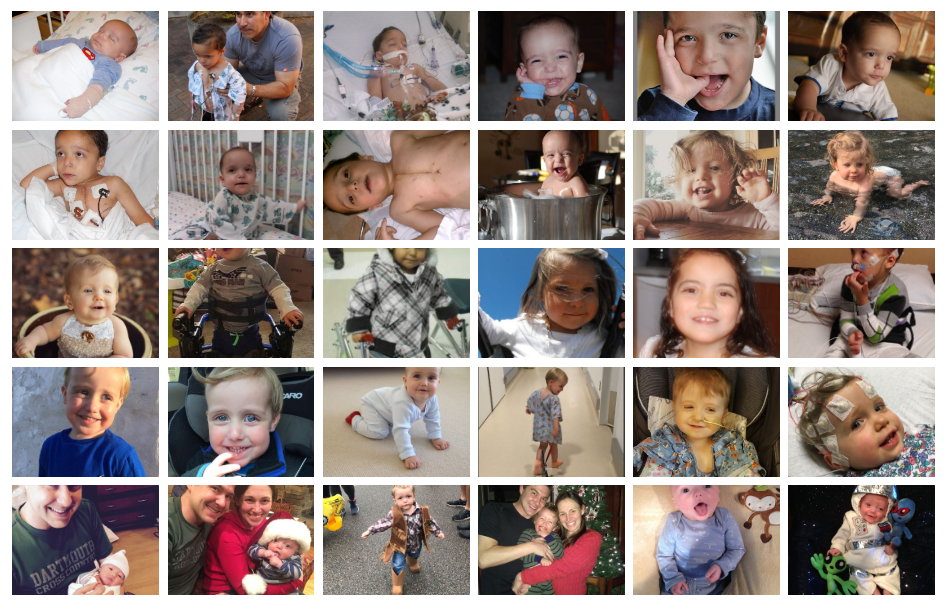
IF YOU SUSPECT THAT YOUR CHILD OR FAMILY MEMBER MAY HAVE ADNP SYNDROME, PLEASE TALK TO THEIR DOCTOR ABOUT GENETIC TESTING.
ADNP has been put on smaller genetic panels which are much less expensive than whole exome or whole genome sequencing.
Two US based labs that offer full tests or panels are Ambry Genetics and GeneDx, both seem to be used at most accademic and children's hospitals.
GENE DX AUTISM XPANDED PANEL
GENE DX AUTISM/ID PANEL
AMBRY GENETICS MULTIPLE PANEL
updated 2/15/20
ADNP has been put on smaller genetic panels which are much less expensive than whole exome or whole genome sequencing.
Two US based labs that offer full tests or panels are Ambry Genetics and GeneDx, both seem to be used at most accademic and children's hospitals.
GENE DX AUTISM XPANDED PANEL
GENE DX AUTISM/ID PANEL
AMBRY GENETICS MULTIPLE PANEL
updated 2/15/20


